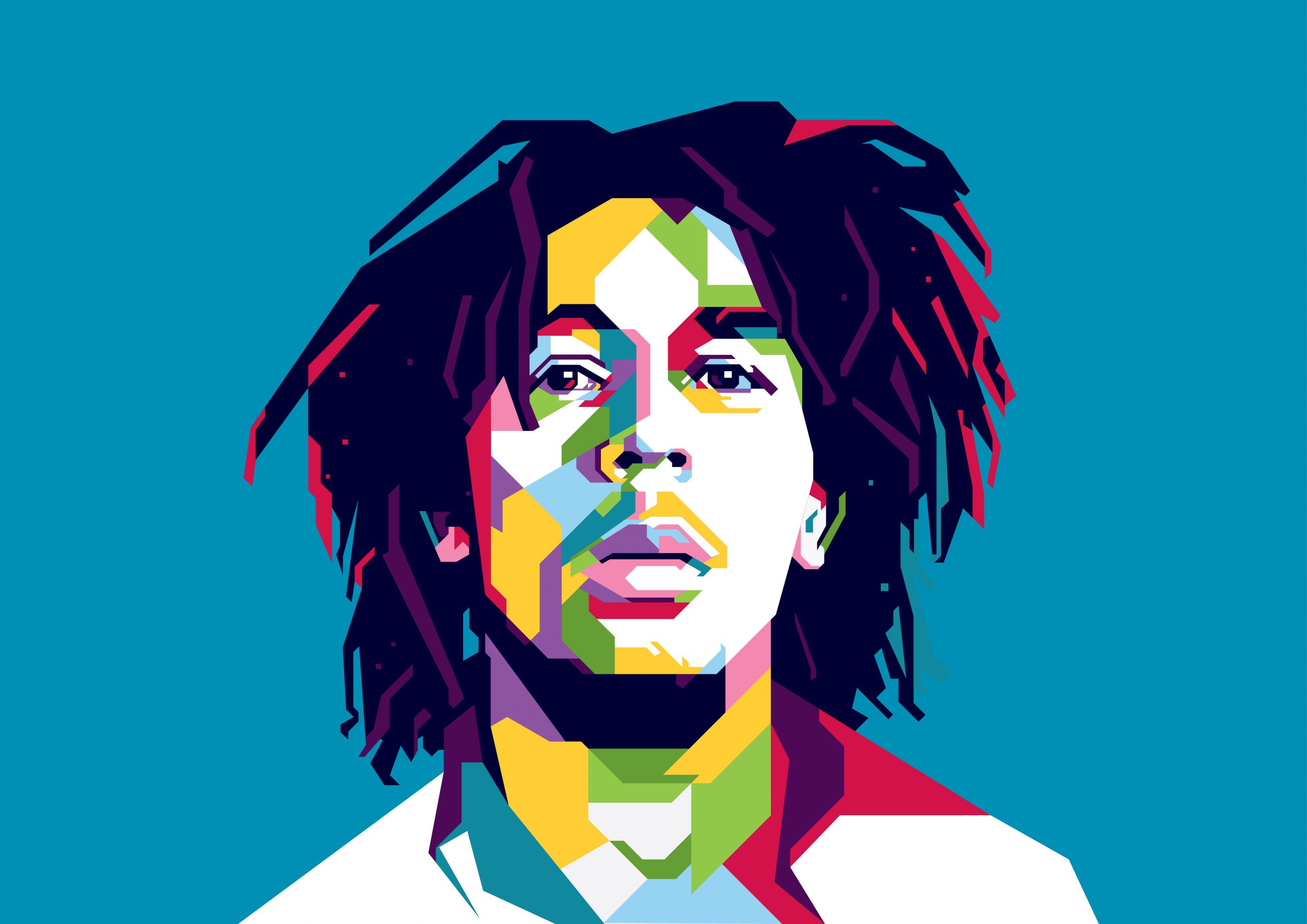
Bob Marley’s music has changed the world forever. Together Bob Marley’s songs can be considered the Sound Track for Equality. Read & hear it for yourself.
“In this great future, you can’t forget your past.”Bob Marley
Almost 40 years after Bob Marley’s death, as American society experiences the first major cultural revolution of the 21st century, his life, words, rhythms, and melodies remain as relevant as ever.
“Those who do not learn from history are doomed to repeat it.” Philosopher George Santayana is credited with this sentiment, but it’s been echoed across modern history by numerous prominent cultural figures. That’s probably because it’s generally true. Its proof can be found across history, perhaps most often in the context of rebellion.
Oppression has a history of longevity. Slavery in the United States lasted hundreds of years. Jim Crow lasted roughly 100. And slavery itself has existed since at least 6800 B.C.E and still does today in less obvious forms.
Album: Catch a Fire; Song: “Concrete Jungle”: No chains around my feet/ But I’m not free/ I know I am bounded in captivity
Although most forms of systematic oppression usually have a relatively long life span, they are always eventually faced with consequent rebellion. It speaks to the defiant nature of the human spirit. Just looking at the United States’ short history, the inevitably of some form of rebellion in the face of oppression becomes obvious. It’s been there since the country’s absolute beginning and remained until today.
- The American Revolution was a reaction to British colonial oppression.
- The American Civil War was forced by southern states refusing to accept the abolition of slavery.
- The Civil Rights Movement of the 1960s was a natural response to Jim Crow.
But of course, none of these revolutions, wars, or movements resulted in what was needed: genuinely equal human rights for all.
Album: Confrontation; Song: “Buffalo Soldier”: There was a Buffalo Soldier in the heart of America/ Stolen from Africa, brought to America/ Fighting on arrival, fighting for survival
Bit by bit, the American people have chipped away at the status quo, and only as a result of mass mobilization has there been any real results. Unfortunately, throughout each of these historical moments, the overall oppression has remained. It’s an oppression that targets black Americans and other racial minorities most of all. And although there has been some relief, this racial oppression still runs rampant in the systems of educational inequity, racist policing, a racist justice system, and subsequent mass incarceration, to name a few. So, as a result, the resistance continues. And today, it has a new name to fit a reinvigorated form of the Civil Rights Movement: Black Lives Matter.
Album: Natty Dread; Song: “Revolution”: It takes a revolution (revolution) to make a solution/ (doo-doo-doo-doo)/ Too much confusion (aaa-aaah), so much frustration, eh!/ I don’t wanna live in the park (live in the park) /Can’t trust no shadows after dark (shadows after dark), yeah-eh!/ So, my friend, I wish that you could see/ Like a bird in the tree, the prisoners must be free
Bob Marley’s Beginnings
In the 1960s, while the Civil Rights Movement was starting in America, a cultural rebellion was brewing in Jamaica, too, helmed in large part by Bob Marley. But before Bob Marley became a martyr to Jamaica, Rastafarianism, Reggae, resistance, rebellion, and civil rights across the world, he was just a man.
Born February 6, 1945, in the small, rural village of Nine Mile, Jamaica, Robert Nesta Marley seemed destined for a life of strife. Even in birth, he was controversial, born to two clashing cultural forces in his home country: the oppressor and the oppressed. His mother, Cedella Booker, was a black 17-year-old descendent of slaves. His father was a white, British plantain supervisor who married his mother when she became pregnant, but completely disappeared from his life shortly after his birth.
Album: Rastaman Vibration; Song: “Crazy Baldheads”: I’n’I build a cabin/I’n’I plant the corn/Didn’t my people before me/ Slave for this country?/ Now you look me with that scorn/ Then you eat up all my corn
So black, single, teenage Cedella, mother to a mixed-race baby, would have to fend for herself. Fortunately, it was in her blood to battle the odds. She was descended from the formerly enslaved Cromantee tribe, who famously staged the bloodiest rebellion in Jamaica’s plantain era. It seems that future rebel-icon Bob Marley was gifted with no small sum of that same fearless DNA, as he would grow up to inspire a generation of rebels. But first, of course, he would have to beat seemingly impossible odds.
Album: Uprising; Song: “Could You Be Loved”: Don’t let them fool ya/ Or even try to school ya! Oh, no!/We’ve got a mind of our own
Although mixed-race children weren’t necessarily uncommon in Jamaica at the time, public perception of them was overwhelmingly negative. In a culture where status was so often decided by race, neither Jamaica’s native black communities nor their white colonial communities were generally interested in accepting a child-like Bob Marley as one of their own.
Album: Exodus; Song: “Guiltiness”: Guiltiness/ Pressed on their conscience/ Oh yeah, Oh yeah/ These are the big fish/ Who always try to eat down the small fish/ just the small fish.
These cultural standards might appear foreign to America from our modern vantage point, but in fact, they were just as rampant, and often even more so, in certain parts of the country during the same time period. In the United States, anti-interracial marriage laws were only deemed unconstitutional in 1967, via the Loving v. Virginia supreme court case. In 1967, Bob Marley would already have turned 31, and he would only have five years left to live.
Album: Exodus; Song: “One Love”: One love, one heart/ Let’s get together and feel all right
Although being mixed might have brought further adversity to Marley’s path, it also provided him with a unique perspective. The circumstances of his childhood and adolescent life — namely poverty and colonial oppression — no longer seemed inevitable. His father had been born into a completely different reality. His opportunities in life were massively more than Bob’s own. His decision to leave his wife, Cedella, and their newborn baby was proof of that. The inevitably of disinheritance was supposedly the final trigger for Norval Marley’s permanent departure, and the simple fact that he was able to choose between this more difficult life and the privileged one he was born into was enough to open the blinds on the possibilities of reality for Bob.
Album: Survival; Song: “Babylon System”: You can’t educate I/ For no equal opportunity:/ (Talkin’ ’bout my freedom) Talkin’ ’bout my freedom/ People freedom (freedom) and liberty!
If there was a more free life to be lived for some — even his own father — then surely there was some path toward freedom for himself and his fellow disenfranchised native-born Jamaicans. Maybe even more notably, the idea of inequity was imbued. There was a reason for their difference in circumstances, and that reason was far from right. Fortunately for her son, Cedella had the foresight to move to Kingston, Jamaica, during the 1950s. As the country’s capital, Kingston was the only real place in Jamaica where the word “opportunity” had any real meaning.
But even there, the odds would be stacked against them. Still poor, Marley and his mother were forced to find refuge in a government tenant yard called Trench Town. This unglamorous name was well deserved, as the yard consisted of a plethora of tar-paper, one-room shacks, where entire families would have to live together in squalor. Even established modern amenities like electricity and plumbing were few and far between.
Album: Chances Are; Song: “Soul Rebel”: I’m a rebel, soul rebel
During the exact same time period, while Marley was coming to terms with his new home, mass segregation was being implemented by the United States government via the implementation of public housing projects. These projects would essentially create real-life ghettos — the same kind of housing the United States supposedly fought to defeat, in part, during World War II.
Although his mother certainly pined for bigger and better things, her young son made his home in Trench Town. He became comfortable in these tough conditions and soon developed a personality perfectly suited for this environment. Before long, he was friends with a large group of boys with a similar aptitude for trouble, and after a while, Marley’s cohorts had helped form a genuine street gang, aptly named the Rude Boys. Although this gang behaved in many of the destructive ways that gangs tend to — prone to some level of violence and proud posturing — it was also Marley’s first foray into genuine rebellion. The Rude Boys became famous, and Jamaica’s establishment became hell-bent on eradicating them.
Album: Burnin’; Song: “I Shot the Sheriff”: Sheriff John Brown always hated me/ For what, I don’t know/ Every time I plant a seed/ He said kill it before it grow/ He said kill them before they grow
Rather than vie for economic control of a particular area, the Rude Boys seemed more interested in expressing their personal freedom, albeit in a hostile manner. Essentially, they did whatever they wanted and would often fight the people who tried to stop them. In retrospect, it seems to be a fairly natural way for people without total freedom and autonomy to try and express some. Fortunately, Marley would go on to find far more productive ways to exercise his independence, intellect, and soulful, rebellious spirit.
As Bob Marley came of age, Kingston’s musical landscape was being taken over by America’s popular urban music. This is perhaps unsurprising, and maybe even inevitable, as black communities in both countries were experiencing similar strife. In the case of the United States, colonizers had come to a country, oppressed the natives, and subsequently imported native-African people to enslave them before enslaving their progeny, too. In the other, colonizers had simply come to Jamaica and imposed their will. In both, the stench of slavery certainly still lingered on society. Music that provided a soulful catharsis for generations of pain and suffering seemed to be one of the only available treatments in both countries.
Album: Kaya; Song: “Crisis”: So – so – so much have been said, so little (been done) been done/ They still killin’ – killin’ the people/ And they – and they havin’ (havin’ their fun) – havin’-a – havin’-a lots of fun -/ Killin’ the people, oo-yoo! – (havin’ fun) havin’ their fun!
This music not only created catharsis, but community. When entire cultures gravitate toward the same music, it highlights their commonalities and draws obvious lines between them and those who wouldn’t so readily understand. Bob Marley understood, and by the 1960s, when he was truly coming of age, the city that he’d adopted as his own was producing its own unique sounds. Jamaican R&B, an altered, locally inspired, and locally produced new genre, would influence the sonic space that Marley’s first foray into music would encapsulate. This music was Ska, and just as R&B-inspired American rock and roll would become the official sound of the 1960s American cultural revolution, Ska would soundtrack Jamaica’s
.Album: Burnin’; Song: “Get Up, Stand Up”: Get up, stand up: stand up for your rights!/ Get up, stand up: stand up for your rights!/ Get up, stand up: stand up for your rights!/ Get up, stand up: don’t give up the fight!
Although Marley was coming into his own during this time period, his mother wasn’t so optimistic. He had become the Jamaican authority’s worst nightmare: famously tough, rebellious, and seemingly spurred on by Ska music. The Rude Boys would often get into fights at Ska dances and concerts. “Tuff Gong,” as they call Marley, then, was no exception. According to Marley himself, though, he wasn’t tied to the Rude Boys in the way that most are. His contributions were autonomously decided upon.
In essence, he was heavily associated by personal choice, but not an actual member. On the other hand, his mom hoped to transcend these economic circumstances and physical conditions, often encouraging her son to find a new path, questioning why he would want to spend his time with these arrogant, often violent men. But Bob expressed no interest in either a new location or direction. Fortunately, Cedella eventually got her wish, later moving to Delaware in large part as a result of her son’s success.
Album: Natty Dread; Song: “No Woman No Cry”: ’Cause—’cause—’cause I remember when a we used to sit/ In a government yard in Trenchtown/ Ob—observing the hypocrites/ Yeah!
It might seem strange, looking back, that someone who would become famous for his idealization of peace, love, and unity, as well as rebellion, of course, wouldn’t want to dissociate from a group like the Rude Boys. But truly, it could be argued that this decision only reveals the strength of Marley’s convictions.
It appears that even early on in his life, he had felt this inclination toward some kind of martyrdom. Not that he wished to suffer, but if his people were being forced to suffer, so would he. He would live through and survive in the harsh conditions of Trench Town to be able to accurately describe its facts and transcribe its voice. In living this hard life, he was stockpiling fuel for his eventual creative output. He would use his pain to change the world. But he certainly couldn’t have imagined the impact his transcription would have on the world — not only in his lifetime but for generations to come.
Album: Confrontation; Song: “Chant Down Babylon”: Me say, Music you’re – music you’re the key/ Talk to who? Please talk to me/ Bring the voice of – of the Rastaman/ Communicating to – ’cating to everyone
“Judge Not” was one of his first officially cut records, and its title, as well as its lyrics, would signal the direction of his philosophy and his life. The sentiment is obvious, and the lyrics echoed the rural sayings that he’d heard his whole life. “So before you point your fingers/ Be sure your hands are clean.” He wasn’t only speaking as himself. He was amplifying the voice of his community and his country. This song was released in 1963, coincidentally, the same year that both the Beatles and Bob Dylan were getting some genuine traction. Although each artist was born and raised in a different country, they were all singing toward a better world.
Bob Marley’s first commercial success came this same year. Marley had written “Simmer Down,” a song that urged Jamaica’s gangs — much like the one he had associated himself with — to stop being violent. But it wasn’t in the voice of the authorities, who wanted a similar outcome. It was the voice of their brother, who feared for their safety at the hands of a reactive government. Auditioned for Clement “Coxsone” Dodd, the country’s most major music producer, it was recorded and released the very next day. It quickly became a hit, and the country had found its voice.
On every album since, and throughout his extraordinary life, Bob Marley’s manifesto was never diluted. Through an assassination attempt, incredible fame, political pressure, and an eventual terminal cancer diagnosis, he remained true to his roots and tried his very best to live by the powerful words he performed. He fiercely championed rebellion, racial injustice, and a future filled with peace, love, and unity. His melodies have been woven into the fabric of music history, and his lyrics still echo in a future generation’s civil rights movement today.






